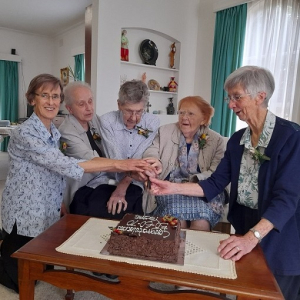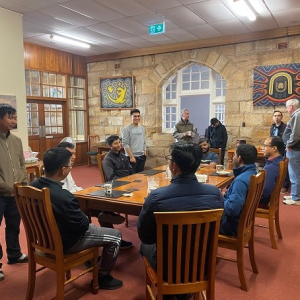Peter MALONE
Our MSC Sisters’ Jubilee Celebrations
Our MSC Sisters’ Jubilee Celebrations
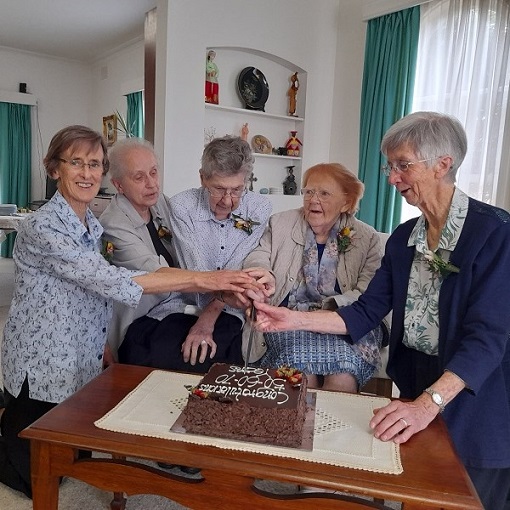
The Sisters celebrate their Foundation Day on the Feast of the Annunciation – and this year some jubilees
Mary Drum, Provincial, a welcome
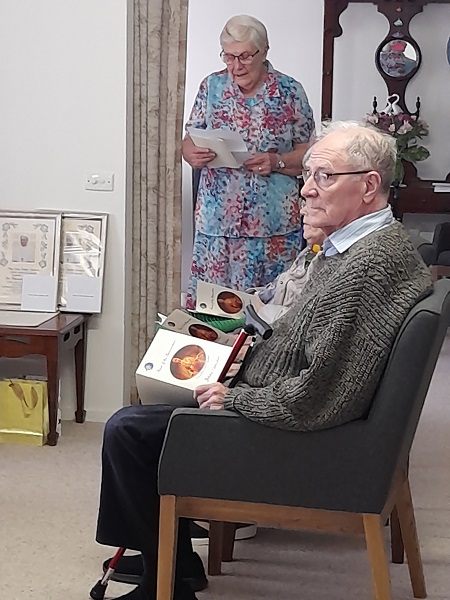
Renewal of vows
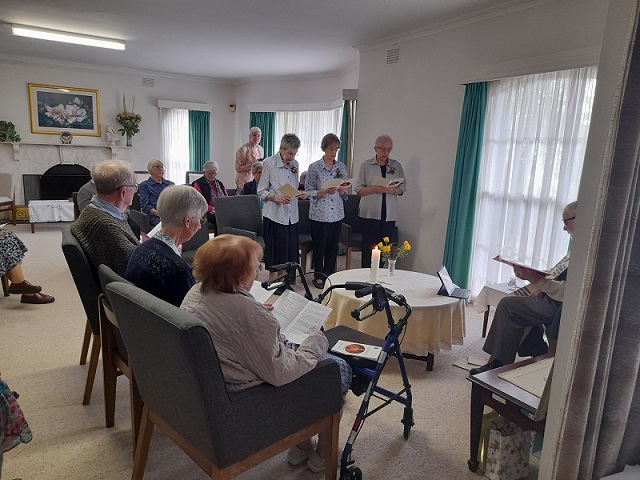
Phil Malone, presider
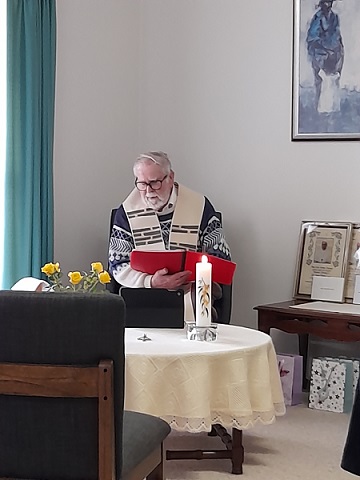
Joan Fisher responds
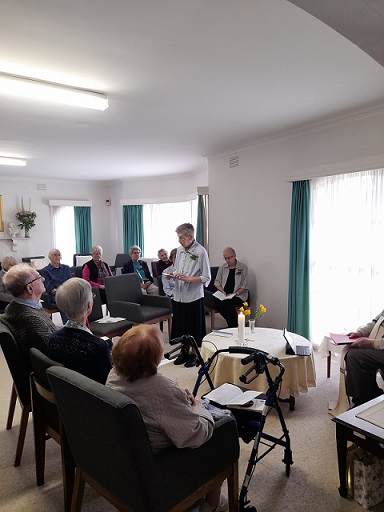
Jubilarians cutting cake – Carmel Butler and Tess Veenker (50 years), Joan Fisher (70 years), Goretti Evans (61 Years), Carmel Slattery (60 years).

A week later, a celebration of Sister Benedict’s 70th anniversary of profession at St Catherine’s Home, delayed from last year.
Mary’s welcome
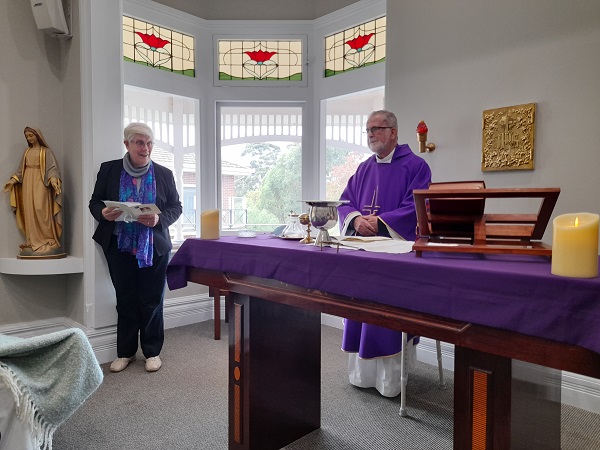
Benedict among her family
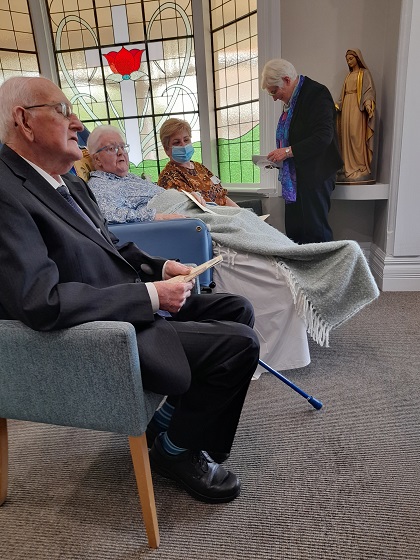
Benedict and her niece Cathy cut jubilee cake
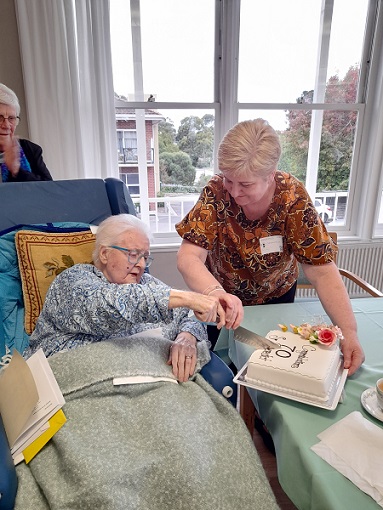
Carmel Slattery sharing cake
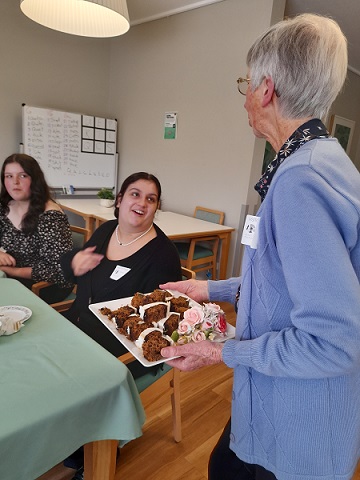
Allelujah
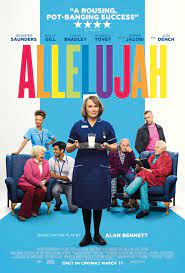
ALLELUJAH
UK, 2022, 99 minutes, Colour.
Jennifer Saunders, Bally Gill, David Bradley, Russell Tovey, Lorraine Ashbourne, Louis Ashbourne Serkis, Paul Butterworth, Judi Dench, Derek Jacobi, Julia Mackenzie, Gerard Horan.
Directed by Richard Eyre.
A rejoicing kind of title! Some might think of Handel’s Chorus. However, this could be quite misleading, especially by the end of the film where the group in the Bethlehem aged care hospital music therapy group enthusiastically sing an MGM/Judy Garland hit, Halleluia, c’mon get happy, get ready for the judgement day…
Allelujah is based on a play by prolific successful playwright, Alan Bennett, noted for his wry dramas as well as his series of Talking Heads monologues (and there are a number of these in this film). His 2018 play has been adapted for the screen by the creator of Call the Midwife, Heidi Thomas. Alan Bennett’s plays can be both funny and tragic, emotional and challenging. As is this one.
We are in Wakefield, Yorkshire, where in the 18th century, there was a literary vicar. But, the 21st-century, we are in a hospital for the aged, the Bethlehem, the Beth, greatly beloved by everybody in the city. Apparently not loved by government bureaucrats, issues of money, issues of closing down. Alan Bennett is very conscious of social issues, critical of bureaucracies, this film, ultimately making an appeal for support for the National Health Service.
The Beth is managed by Sister Alma Gilpin, an unexpectedly serious performance from Jennifer Saunders, highly efficient, dedicated, working with diligent assistant, with a sympathetic doctor, Dr Valentine, Indian background and studying for his becoming a British citizen (a sympathetic Bally Gill). He narrates the film, his love for the elderly, his medical and personal care.
And we see a number of the patients, a range of “Talking Heads” comments from several women patients, not so many men there but we see Derek Jacobi as a retired teacher, articulating literary quotes, but more attention to a crotchety old ex-miner, played by David Bradley, a lot of the film focusing on him and his visiting son, played by Russell Tovey. There is also a former librarian, the welcome presence of Judi Dench. And a very old girl lady played by Julia Mackenzie evoking memories of Miss Marple.
Perhaps, so far, so expected!
Sister Gilpin is to receive the city’s award, and we see her diligently working with the patients, quite personally. The main complication concerns the father and son, issues of opposite political stances, a gay issue, the son advising the government about the closing of The Beth. So, much of the dramatic tension as well as the hospital issues are focused in the interactions between father and son, and Sister Gilpin working with the father’s health issues.
There is some added confusion when a camera team comes in to make a documentary promoting the Beth. And, emotional complications when a daughter and her husband start charging in about the death of the mother and wanting an investigation.
A lot of the British public’s response to the film has been very negative, perhaps their wanting something more cheery overall and disappointed at the tone of the film, especially the ending, and Dr Valentine’s highly emotional and insistent Talking Head speech to camera about aged care, government interference. And, there is a 2020 addition to the film where the Beth is closed, Dr Valentine is working in a covid ward when Derek Jacobi is one of the patients.
An arresting screenplay, much clever writing, serious and humorous quips, a wonderful gallery of British character actors – and the continued social challenge about governments and healthcare.
- The title and its tone? Alan Bennett, his plays, themes, social observation, criticism? The song: Alleluia come on get happy, prepare for the judgement day? Sung by the choir in the home, the occasion – and the ironies?
- England, Britain, the 2010
- s, the NHS, hospitals, patients, beds, needs, care, medication, therapies? The Tory government, restrictions, attack on the NHS?
- Yorkshire, Wakefield, the town, the residents, their esteem for Bethlehem hospital, the Beth? The picturing of the testimonies, speeches, papers and articles? The closing down of sections, the threat to the closing?
- Issues of aged care in the 21st-century, hospital, treatment, crowding, staff? Financial support? The narrative by Dr Valentine, his character, Indian background, developing his English, preparing for becoming a British citizen, his family, the videos on the phone, the support, his love for the aged, his medical care, his narrating the events?
- Sister Alma Gilpin, Jennifer Saunders in the role, her presence, age, experience, efficiency, her demands on her assistant, interactions with Dr Valentine, her timetable? Her later explanation of her life and her nursing, her mother, helping others, helping her mother? Her devotion to duty, bossy with the aged, but caring? Audience detecting indications for the climax of the film?
- The picture of the staff, their work, Andy, his age, doing community service, the details, his interactions with different patients, especially with Joe Colman? His discussions with Colin, the possibility of moving to London?
- The range of the elderly, the snapshots of various characters, the women, one talking in a wry bald way, the other about her family, the other banging on the tinplate and wanting to go to the toilet…? The men, fewer, Ambrose and his teaching background, love of English, the quotes for various occasions, helping Dr Valentine with clarifying English? The old man, sitting in the background, at the sing songs?
- The place of the sing songs, music therapy, the group gathered, the range of songs, the MGM musicals, the eagerness of the conductor? Preparing for the ceremony for Sister Gilpin?
- The focus of attention on Joe Colman, the mining background, age, illness, crotchety, memories of his wife, the wedding ring despite the swelling and his fingers? Alienation from his son? His son visiting him, not bringing a gift, wanting grapes, later bringing the grapes, the discussions, the memories? His dissatisfaction with his son, the memory of his singing and raising money during the 80s strikes, wanting his son to sing? His son, sexual awareness, the streets, leaving for London, his partner, phoning him? Staying at the hotel, his presence in Wakefield, his work, advising the Minister, critical of the NHS, his documents, the arguments for closing? The encounter with Dr Valentine, Dr Valentine showing him the abandoned ward, the equipment, what it was capable of? His later visit with his father, willing him around, singing, in the conservatory?
- Mary, quiet, librarian, shy before the camera, Dr Valentine giving her the tablet, her filming, the irony of what this would lead to?
- The camera group, the interviews, the aged, the honorary head, formerly mayor, his eagerness, cover-ups? The situation with the Earnshaws, their mother, 92, ill, dementia, her ramblings, drinking the milk, her death, the Earnshaw and their upset, their demands?
- Sister Gilpin, reminiscing with Dr Valentine? Her treatment of Joe Colman, dancing with him, movement in his feet? Dr Valentine and the removal of his ring? Getting better? Sister Gilpin bringing the milk, leaving it for him, his knowing what this was for, his drinking it? His death, his son in London, returning, demands?
- Mary, the video, sister Gilpin and the milk, talking to Dr Valentine, his disappointment? Ringing the police?
- Sister Gilpin, concerned about her speech, Dr Valentine urging her to speak from the heart? Her speech and the response? The police arriving, her being taken away?
- Many audiences, especially British, highly critical of this change of mood and pace for the film?
- The final scene, Dr Valentine, Covid, his work on the wards, Ambrose ill, dying?
- Dr Valentine’s impassioned speech to camera about the social situation, England, the NHS…?
Air
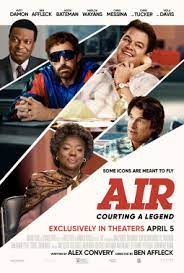
AIR
US, 2023, 111 minutes, Colour.
Matt Damon, Jason Bateman, Ben Affleck, Chris Messina, Viola Davis, Julius Tennant, Damien Jung, Chris Tucker, Matthew Maher, Gustaf's cask guard, barbarous or colour, Jane Moore, Joel Grech, Marlon Wayans.
Directed by Ben Affleck.
A very American entertainment. And, the response in the United States has been overwhelmingly positive. The film will travel but it cannot evoke the same kind of response beyond the United States because of its subject, the National Basketball Association, players and contracts, promotion, sponsorships, and a special focus on the shoes that the basketball players wear. The focus is very American.
And, the year is 1984, with an initial collage evoking memories (but, anyone who was 10 at the time is now 50 – which means that for younger audiences there is a touch of if not ancient history, old history). We see and hear president Reagan, see Eddie Murphy the Beverly Hill Cop, the Ghostbusters…
This is a true story, actual characters are named and portrayed, strengths and weaknesses, and, at the end, interesting information about their subsequent careers. And the setting is the shoe company, Nike, running third in 1984 to shoes made by Converse and I the ever-growing Adidas. At Nike, there is a talent scout, Sonny Vaccaro, an excellent solid performance by the always reliable Matt Damon. For 20 years he has scouted, has searched for the ideal player, studied games, moves, manoeuvres, tactics and sees a future for the 18-year-old Michael Jordan. For American audiences, Michael Jordan is one of the greatest athletes of all time – perhaps well known outside the US but, maybe not so well-known.
In the film, Michael Jordan himself appears in video clips, in the background when Sonny Vaccaro visits the Jordan home in North Carolina, in the background at a family meeting with Nike executives. Which means that the film is not about actual basketball playing, only some glimpses.
Which also means that this is a film about American capitalism, the world of business, the world of profit, deals, manoeuvres, pressures (and the touch of what might be called blackmail). This is a film about the American dream, the dreams of individuals being true to themselves, that success is the goal of life, perhaps a touch of the Protestant/Calvinist influence in the early centuries of US development, that God blesses those who are successful.
The film has a very strong cast. There is Jason Bateman as an executive of Nike, careful, but eager, getting older, visitation rights to his daughter a couple of hours every Sunday. Actually, this is in rather marked contrast with the other central characters who don’t seem to have any relationships or any life outside their work. Ben Affleck, who effectively directs the film, appears as Philip Knight, the CEO of Nike, Chris Tucker as an executive, smooth talking promoter, a cameo by Marlon Wayans as sports coach, George Haverling who has a speech about Martin Luther King’s I have a dream speech as an inspiration for fighting for dreams. And, there is a powerful performance by Viola Davis as Michael Jordan’s mother, shrewd, business savvy, and making contract demands for her son to receive a percentage of every shoe sold with his name, Air Jordan. (Later information indicates that this was a cause that Sonny Vaccaro took up in later decades, and won.)
There is excitement all the time, Sonny and his plans, support, opposition, some hilariously crass interchanges with Jordan’s agent, David Falk (Chris Messina), suspense concerning Jordan’s choice of Adidas or Nike, waiting at the telephone…
And, there is a collage of Jordan’s later life, sport success, personal messiness in his life, yet his being considered one of the greatest American sports athletes.
- A film for American audiences? Basketball? Michael Jordan? Nike?
- The 1980s, the collage of memories of the period, politics and Reagan, music, movies and Eddie Murphy and Ghostbusters? The Olympics?
- The film based on actual events, actual characters? The information at the end about their subsequent careers, philanthropy, social justice activities? Michael Jordan and his status as an athlete?
- The Nike headquarters, offices, meeting places? Exteriors? The comparison with Converse, with Adidas?
- Atmosphere, the musical background, the songs of the time, lyrics, applications to characters and events?
- The role of Sonny Vaccaro, Matt Damon’s presence and performance, age, 20 years’ experience, a scout for the company, his detailed knowledge, expertise, going to games, observing, the trips to Las Vegas and some gambling, no indication of personal life?
- The company, shoes, sports, basketball, third to Converse in Adidas? Ambitions? Budget? Philip Knight, the CEO, the board? Knight and his personality, running, meditation, management risks, caution? Interactions with Sonny? His saying no, hesitations, running, change of heart, supporting Sonny, the tactics for the final meeting, to arrive late, his labouring explanations, quiet, the video? Support, the contract, percentages for players?
- Rob Stressor, his role in the company, friendship with Sonny, the discussions, the risks, budget? Home life, divorce, visitation rights? Under stress, his birthday? The discussions with Sonny, spending the time, the plans, supporting Sonny?
- David Falk, agent, the telephone conversations, his exasperation with Sonny, agent for Jordan, the family, adaptable, the meetings, the aftermath, selling his company, eating alone…?
- Sonny, strategies, his being convinced, the video of the game, pinpointing Michael Jordan’s talent, explaining his tactics with the team? The decision to visit the family home, North Carolina, the friendliness of the father, the business sense of Deloris, the discussions, her listening, the meetings with Adidas? The discussions of the contract, the fact that Sonny visited? The family coming to the Nike headquarters, the meeting, the strategy, Philip Knight late, Howard, Rob, the shoe designer, the discussions? Waiting for the decision?
- Howard, his role in the company, interactions with Sonny, listening to him, suggestions, support? His later career with Nike?
- Sonny’s visit to George Raveling, their discussions, his talent, career, the talk about Martin Luther King, the March on Washington, the I Have a Dream speech, Martin Luther King and his audience, creating the second part, giving the text to George, (and his never selling it), the influence of the American dream?
- The visit to the Adidas company, the board meeting, the widow? The meeting going as Sonny predicted, clothes, ties, watch?
- The phone call, Sonny and his excitement, Deloris and her shrewdness, the $250,000, the car, and the contract with benefits for the player? Sonny and his hesitation, the discussions with Philip Knight, the agreement?
- The presence of Michael Jordan in the film, background, videos of his play, glimpses at home, in the background of the meeting, Sonny and his phone call to him? The collage of media and his subsequent career, difficulties, talent, recognition?
- The film not about basketball, but about big business, success, capitalism, advertising and sponsorship?
- A version of the American dream, self-confidence, despite odds, and the personal, individual, drive, and the Protestant American tradition of God/Providence blessing those who succeeded?
Mr Malcolm's List
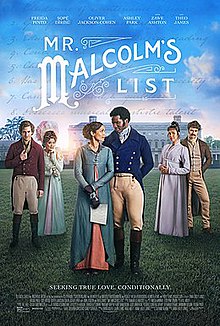
MR. MALCOLM'S LIST
UK, 2022, 119 minutes, Colour.
Freida Pinto, Zawe Ashton, Sope Dirisu, Theo James, Oliver Jackson-Cohen.
Directed by Emma Holly Jones.
Back to the Regency era, back to Jane Austen’s world. There have been many, many versions of Jane Austen’s novels for cinema and television. There have been various interpretations: Bride and Prejudice, Pride and Prejudice and Zombies, 20th century Emma as Clueless. Here is another variation.
This film is based on a self-published novel by Suzanne Allein (finding a publisher after a 12 minute prelude to the story was screened extensively on YouTube with almost the same cast as the film). Here she collaborates with first-time director of feature films after short films, Emma Holly Jones.
Most audiences have enjoyed this excursion back into this British past, especially with the popularity of Sanditon BBC TV, Bridgeton on Netflix.
And, it is another variation on pride and prejudice, an aristocratic lord who has his list of what is required for his suitable wife, an attractive young woman, full of sense and sensibility, from the country. She is embroiled in a plot by her schoolfriend who is a variation on Emma, this time rather maliciously interfering in people’s lives. And, the dialogue fits the period, articulated elegantly. And the costumes and decor are exemplary.
What makes the difference, a difference that has disturbed some audiences, is that the central characters are played by British actors with a range of backgrounds, Indian, African, Japanese… Along with some traditional white actors. A comment that might be helpful is that this is contemporary British cinema interpreting the British past.
Freida Pinto (who made such an initial impact in Slumdog Millionaire) is Selena, the daughter of a parish minister, from the country, becoming involved by her friend, Julia, in a plot to humiliate the aristocrat. They are played by Zawe Ashton and Sope Dirisu. Drawn into the action is a soldier who was at Waterloo, played by Theo James.
Another interesting observation is that there is a 21st-century parallel to Mr Malcolm’s List, the various online dating sites and the requirements of giving indications of compatibility for those who want to meet!
The best response is simply to sit back, go back into the Jane Austen world, enjoy the look, the sound, the life of the more wealthy classes, the intrigues.
- The popularity of Jane Austen’s novels, film and television versions, variations on her novels, immersion in this world of the Regency period?
- Costumes and decor, locations, mansions, interiors, the countryside? The musical score?
- The title, Mr Malcolm and his requirements, observing women, putting ticks behind his list? And the device for Selena to have her list?
- The opening, the two young girls, at school, the rich girl, the scholarship girl, their bonding?
- London after Waterloo, society, the military? The aristocracy? The introduction to Julia, wealthy, her family, the influence of her mother, at the Opera with Mr Malcolm, his being bored, Julia and her ignorance, the test about the Corn Laws, her failing, Mr Malcolm not pursuing her, the newspapers, her sense of humiliation, wanting revenge?
- Selena, with her parents, intelligent, well read, attractive, the invitation to come to London? The journey, staying with Julia and her family?
- The presence of Lord Cassidy, Julia’s cousin, his personality, charm, not always sharp-witted, his friendship with Mr Malcolm, learning of the list, talking with Julia, hearing of her revenge plan, trying to dissuade her, but going along with it, the encounter with Selena, his various complicities with Mr Malcolm and Selena meeting? Julia’s plan that Selena should meet every criterion on the list, and so deceive Mr Malcolm?
- The variety of situations, the chance encounter of Selena first meeting Mr Malcolm, their not knowing each other, the favourable impression, then the introduction? Selena being troubled? Her interpretation of Mr Malcolm?
- Ossory, the military background, Selena looking after his aunt, being transferred to London, friendships? His place in society? Lesser status?
- The various encounters, socials, the list and Selena fulfilling the demands? The deception about the piano playing with Lord Cassidy fingering the piano?
- Julia, dominating, her mother, bent on revenge, malicious and petty? Setting up Selena?
- The elegant socials, society, costumes, masked balls, dancing?
- Mrs Covington, her marriages, chatter and giggle, making a bad impression, Julia claiming she was her cousin, Selena keeping quiet, her being invited to the estate, the truth and Mr Malcolm believing Selena not to be truthful?
- The visit to the estate, the invitation to Selena’s parents, their presence, conversation, observations? The misapprehensions, Selena and the confrontations, Mr Malcolm, wanting to propose to Selena? The difficulties with the list? Selena, her stands, deciding to leave? Mr Malcolm and his stubbornness? His mother observing, listening? The notes for them to meet in the garden, the failure of the meeting?
- Mr Malcolm, his mother, coming to his senses, Selena in the carriage, his riding the horse, the explanations, the proposal, the future? (And the credibility of Ossory and his attraction towards Julia, her attraction, change of heart?)
Aurora's Sunrise
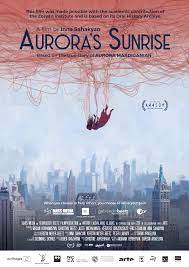
AURORA'S SUNRISE
Armenia/Germany/Lithuania, 2022, 96 minutes, Colour.
Anzhelika Hakoyyan.
Directed by Inna Sahakyan.
A very impressive film on various counts, both its content as well as its visual style.
The film tells the story of a young woman, Aurora Mardiganian, her family in Anatolia, 1915, working with materials and colours, threatened by the Turkish government, the beginning of the Armenian genocide and the consequences for her family, their deaths and her survival. Through a strange set of events, she was saved, was taken to St Petersburg where she set sail for the United States. On her arrival in the US, moving through Ellis Island, some entrepreneurs found her, persuaded her to tell her story, had it translated from Armenian into English, serialised it in the newspapers. She was hoping to find her brother who lived in the United States. An organisation for the saving of exiled Armenian children sponsored her.
This led to Hollywood, her appearing in the 2018 film, Auction of Souls, her travelling to promote the film until she collapsed and her entrepreneurs located her quietly in a convent while they found substitutes to continue the tour.
She left the convent, found the people in charge of the charity. After that, she lived a quiet life in the United States living into the latter part of the 20th century.
Most of the film is animated, a delicate style of animation, paper cutout computer graphics. This enables the story to be told in a range of detail, family life, the attack of the Turkish soldiers, aspects of the genocide, the trek through Europe, St Petersburg, and life in the United States, the making of the film and its promotion.
Most important also for the film is the fact that prints of Auction of Souls disappeared. However, some footage was discovered in the 1990s, 18 minutes from the film. And these minutes are inserted into this documentary, quite extraordinary footage of the genocide, crowd scenes, soldiers, brutality, exile. The insertion of these film sequences at various stages of the narrative are quite powerful, reminding audiences about the genocide – with a commentary that many nations eventually recognised the genocide, including the US in the 21st-century, and the fact that the Turkish government has denied it.
And, throughout the film, there is interview material with the elderly Aurora (her original Armenian name changed so that Americans could grasp it more easily). The interviews are very forthright, reminiscences, commentary on her feelings, and the desire for the Turkish government to acknowledge the truth.
Aurora’s Sunrise has won many awards internationally. It offers an opportunity for audiences to see aspects of the genocide dramatised soon after the events, as well as to appreciate the personal story of Aurora, a survival, escape, the film, American exploitation, her life.
Silencing, The
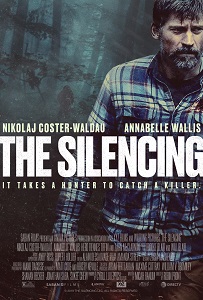
THE SILENCING
Canada/US, 2020, 93 minutes, Colour.
Nikolaj Coster-Waldau, Annabelle Wallis, Zahn McClarnon Hero Fiennes Tiffin, Charlotte Lindsay Marron.
Directed by Robin Pront.
This is a very tough action thriller, a revenge thriller, set in the American woods.
At the centre is an alcoholic former hunter, grieving at the disappearance of his daughter, a devotee of preserving the wilderness, and his setting up a sanctuary in her honour, ousting hunters. He is played by Danish actor, Game of Thrones in many films, Nikolaj Coster-Waldeau.
Also at the centre of the film is the local sheriff, played by Annabelle Wallis, who becomes concerned when other girls disappear, and has an encounter with her younger brother and helps him to escape when he seems to be the perpetrator of the kidnappings.
There are complications in the confrontation between the hunter and the sheriff, his eventually having to save her from a trap in which she was caught and he had set. She has a change of heart, his concern about a young woman that the hunter had rescued from being pursued through the woods, finding her unable to speak because of injuries to her throat. The local doctor is asked to come in to help.
There are various suspicions, the hunter being held, the issue of the sheriff and her younger brother, and eventual suspicion on the doctor who has his own story about his missing daughter – and his strange obsession in rescuing young girls from bad parents to protect them, but also injuring their throats so that they could not speak.
For those who like revenge action thrillers, forest settings.
- The title? Revenge film? The victims? The cruelty and the being silenced, pursued, killed?
- The Canadian settings, the small town, homes, police precincts, shacks out in the forest? The forest locations and atmosphere? The musical score?
- The credits sequence, vast, scenery, the river, the body in the river?
- The introduction to Rayburn, hunter, the rifle, the two brothers, apprehending them, taking the rifles? His hut, breaking down, no phone? Yet the surveillance cameras, the screens in his house? A loner, drinking? The encounters with his ex-wife, her husband, Blackhawk, her pregnancy? The memories of their abducted daughter, aged 14? Rayburn and his putting up the posters? Rayburn and his shift to the environment, the children and the lessons and his explanations?
- Alice, short time as sheriff, the interactions with Blackhawk, members of the police force, lack of confidence in her? Her relationship with Brooks, his troubles, protecting him? The dead girl in the forest, the wound on her throat? The interactions with Rayburn, his dismissal of her?
- The mysterious character in the forest, disguised like a bear, blending into the background? Rayburn seeing him on the cameras? Going out, the pursuit, the vicious arrows? Rayburn finding Molly, the wound on her throat, shelter, carrying her, her surviving, hospital? Alice and her investigations?
- The problems with Brooks, finding him disguised like the Hunter, Rayburn taking him, Alice coming into the house, the rifles, confrontations, Molly with the rifle, Brooks wounding her? Alice shooting Rayburn? His wife coming, bringing the doctor (whose daughter was also abducted), the operation, Alice’s intervention?
- The confrontations, Alice and the arrows, asking the local Native Americans for information, the specific nature of the arrows, the sling? Suspicions, Rayburn and his search, finding the house, confronting the man, the killer, his explanations, silencing them, the girls and their having harsh and drinking father is?
- Alice arriving at the house, the confrontation with the killer, Rayburn taking him to the forest, the animal traps, pushing him into the trap, the spikes, shooting him?
- Vengeance achieved? The bottle of alcohol, the flashbacks to his buying it, memories of his daughter, her absence, throwing away the bottle? The future?
Run Hide Fight
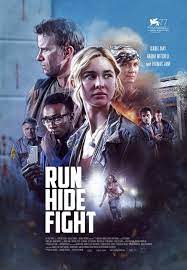
RUN HIDE FIGH
US, 2020, 90 minutes, Colour.
Isabel May, Thomas Jane, Radha Mitchell, Eli Brown, Ollie Sholotan, Treat Williams, Barbara Crampton, Cyrus Arnold.
Directed by Kyle Rankin.
This action thriller is tough going. In fact, many audiences have found it too tough, distasteful. The title refers to how one should cope with an aggressive situation.
This is a film about high schoolers but different from the ordinary films rather, echoes of Gus van Sant’s Elephant, and issues of school shootings.
The film focuses on Zoe, Isobel May, hunting with her father, Thomas Jane, her relationship with her mother, Radha Mitchell. However, most of the action takes place at school, relationships, but for young students, armed, attacking fellow students, killings, hostages, confrontation with the principal, his death, the security guard.
At the centre is a vicious and vengeful student, a megalomaniac.
There are many scenes of action, confrontation, students fleeing, innocent students killed. However, Zoe uses her ingenuity, works with the local authorities, eventually confronting the megalomaniac and leaving him to bleed to death.
Strong technical qualities but a confronting reminder of the number of school massacres over the years in the United States, the inadequacy of gun laws, vengeful motivations.
- The title, indication of the narrative?
- The action taking place over one morning, the scenes at home, the right to school, Prank Day at school, the students gathering, the pranks, the teachers? The invasion of the cafeteria, the siege, the killings? The rescues, the police, resolution?
- The home sequences, ordinary, the hunting, out in the woods? Zoe and the death of her mother, assertiveness towards her father, refusing to accept her mother’s death? Wearing his jacket? Defiance, going to school?
- The importance of the opening sequence, father and daughter with their rifles, lenses, the shooting of the deer, discussion about its death, the blood, beating it with the rock? Venison, for the family, food? The father seen skinning it? The reprisal at the end with the confrontation with Tristan?
- The device of having Zoe and her mother appearing, the conversations, the wise advice of the mother, that she died once but that Zoe had her dying frequently, urging her to let go, be at peace, her life, encouraging her during the crises?
- Zoe, the friendship with Lewis, driving together, banter? The classes, Mrs Crawford, expressing her disappointment? Zoe and her blasé attitude towards finishing at school? The classes, the students, interactions? Her locker?
- Lewis, bespectacled, friendship with Zoe? Meeting at the cafeteria? The talk, her reaction, the spilling on her clothes, going to the washrooms, seeing Catherine and the roof? Not knowing what had happened, the wounded girl coming into the washroom, dying? Lewis, and the siege, his camera, his followers, having to film Tristan and follow him around?
- The impact of the attack on the cafeteria, the van, the group, the shootings, killing indiscriminately, with determination, the teacher coming to apologise and his being shot? Catherine going out, to cut the phone lines, the encounter with Zoe, the pursuit, the balloons, Zoe emerging, the fight, turning the revolver, Catherine dead? The reaction of her brother at the news? Her brother, raging, shooting? The other shooter, pursuing Catherine, in the theatre, her taking him, tying him up? His explanation about his being humiliated, naked, mocked? Zoe persuading him to change his attitude, to be remembered better, his return, the rifle, wounding Tristan, his being shot? The brother, pursuing Zoe, her father hearing the news, coming, the rifle, off the truck, shootings the man as he was about to shoot Zoe?
- The students in the cafeteria, their fears, the shootings? The students in the classroom, the initial reaction to pranks? Zoe and her persistence, Mrs Crawford in the class, Mrs Crawford helping her? The rescuing of the other groups?
- Tristan, character, megalomania, his mother and the television? His friends? The plan? His arrogance? Treatment of people, shootings, threats? Getting Lewis to film him? The importance of the television, numbers of followers? The deaths? Kip coming and shooting, his relying on the explosives? Zoe, the confrontation with him? Her setting the van, out of the cafeteria, the explosion? The students escaping?
- The irony of her being arrested, in the van, the sheriff apologising?
- The sheriff, the explosives out in the fields, roadblocks, his deputy going in and being killed? His arrival, trying to deal with the situation, talking with Tristan? The siege, the aftermath?
- Todd, his relationship with Zoe, the hunt, the antagonism, hearing the news, coming to the school, the rifle, shooting Zoe’s assailant? Being arrested?
- Lewis, being wounded, Zoe rescuing him, the declarations of love?
- The aftermath, Zoe seeing Lewis, pursuing him, going to the buried chest, shooting him, the confrontation, his dying like the deer?
Gathering at St Mary’s Towers
Gathering at St Mary’s Towers

Our Vietnamese brothers have arrived for the Chapter
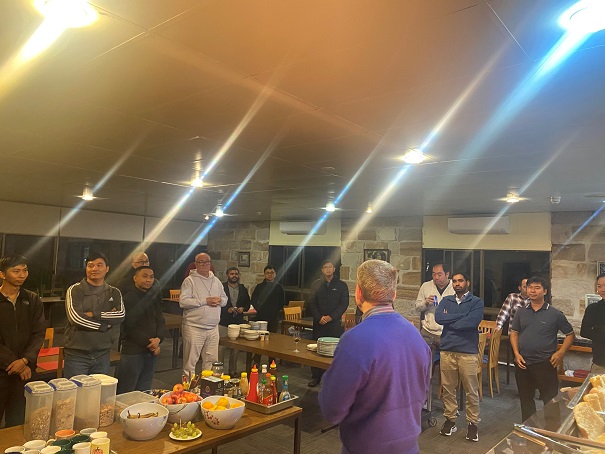
and are spending a few days at DP
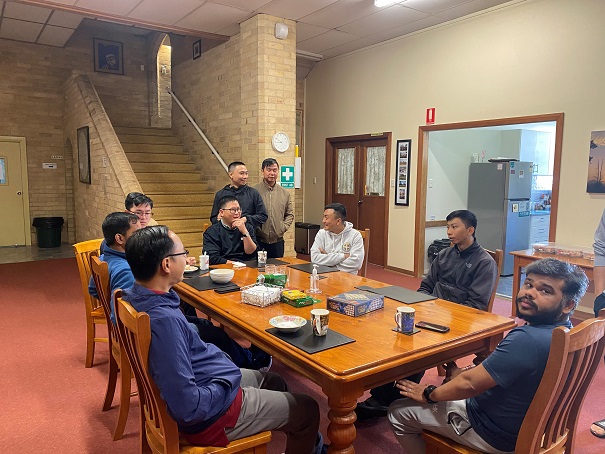
with some of the more recently-ish Australian finally professed.
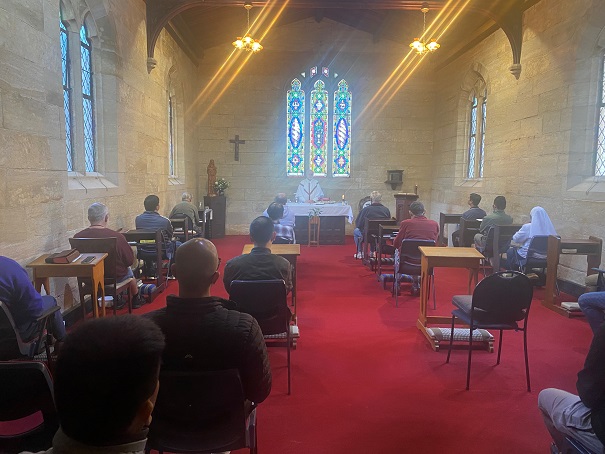
With thanks to Trieu Nguyen MSC for the photos.
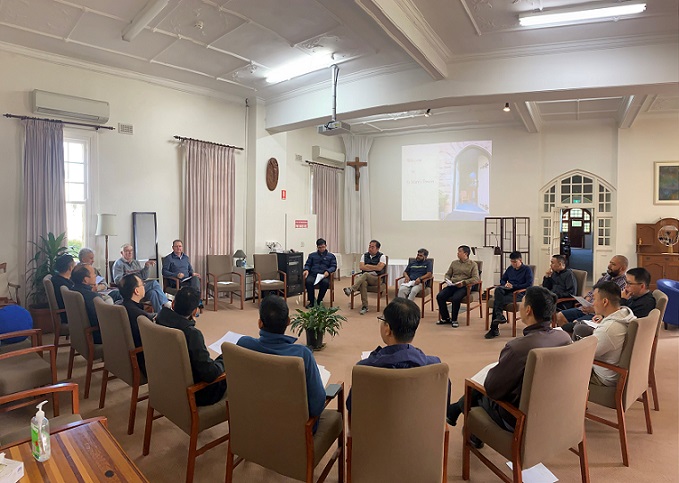
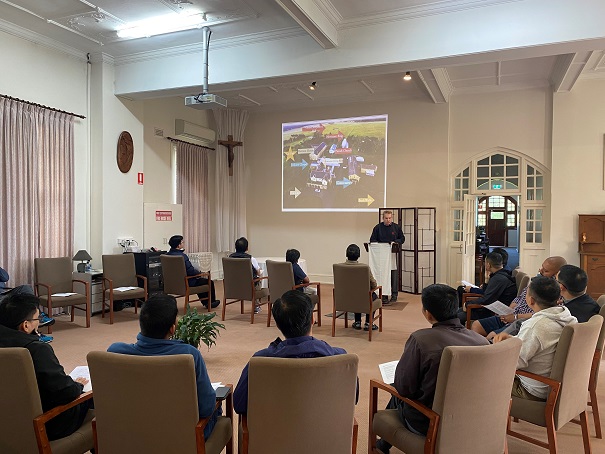
Georgetown
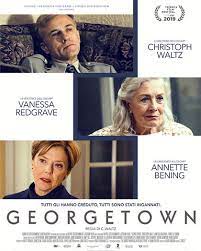
GEORGETOWN
US, 2019, 99 minutes, Colour.
Christoph Waltz, Vanessa Redgrave, Annette Bening, Corey Hawkins, Laura de Carteret.
Directed by Christoph Waltz.
With the title, the focus is on Washington DC, Washington society, political, commercial, business, affluent society.
The film is also based on an actual character, a con man with a shady past, much of it created by himself, engineered with planting evidence. He ingratiates himself into Washington society with his ambitions. He marries an older former journalist, to the surprise of Washington society, to the upset of her daughter.
The journalist encourages his career, sets up a foundation, hosts social functions, makes all kinds of connections.
In fact, the conman murders his wife.
The film is directed by Christoph Waltz (two Oscars directed by Quentin Tarantino, Inglorious Basterds, Ddjango Unchained). And he takes on the central role, fitting it perfectly, the smooth villain who does have his moments of upset. There are flashbacks to his fictitious past, his creating of his persona, passing it off in Washington, his marriage to the older journalist, played by Vanessa Redgrave, to the upset of her daughter played by and that Bening.
He glories in Washington society, makes all kinds of international contacts, especially with French Embassy personnel, create a military past in Iraq, works on his foundation and society gatherings for fundraising.
Later in the film, he is seen in homosexual relationships, their affecting him personally and the consequent killing of his wife.
Intriguing in itself but a reminder that it is based on actual characters and events.
- The title, Washington DC, the setting? The film based on the article: The Worst Marriage in Georgetown?
- The device of using chapter titles, evocative, Mott and his behaviour highlighted? Moving around in time, the present, the flashbacks?
- DC settings, the range, apartments and home, social gatherings, political gatherings, home dinners and banquets? The musical score?
- Fraud, murder, the portrait of a sociopath? Based on the actual character, his crimes and murder, his sentence?
- The structure of the story, the introduction to Mott, the flashbacks, his origins, pretences, moving to DC, ingratiating himself, the relationship with Elsa, the hostility with Amanda? Also urging him on, the foundation of the NGO, his boasting and promises, achievements – and lack? The range of twists?
- This is society, wealth, culture, political?
- Mott, his origins, name, Iraq, military service, rank, coming to Washington, his ambitions, perpetrating the fraud, at ease with lies and deception, charming manner, visualising his frauds? Yet rage underneath, his outbursts?
- Amanda, her concern about her mother, her mother announcing the engagement, Amanda and her hostility towards Mott, coming from Boston, her visits, a character, trying to protect her mother? The end, inheritance, legal issues?
- Elsa, her personality, her background in Germany, writer, journalist? Astute, yet deceived by Mott? Life, widow, relationship with Amanda? Meeting Mott, his ingratiating himself? Her dependence, the announcement of the engagement? The marriage, her continually urging Mott on, to further achievements, connections? Hosting dinners?
- Mott and his past, the Iraqi background, the claims, his rank, uniforms and medals? His work in DC, tours of the White House, his being ousted? Becoming the equivalent of a butler for Elsa?
- The political connections, discussions, the NGO, his entree to politicians, the former French president, the talk, persuasion, visits, the dinners?
- The NGO claims, the international connections, the war situations, the clash with Elsa, his leaving the house, his becoming the corresponded, the messages continually coming into Washington, his being on the frontline? Seen in his tent? And the expose that he was still in the country, the fake tent over the years?
- His assistant, the revelation of the sexual liaison, the man turning against him?
- The clashes with Elsa, temper, the staircase, her death? Mott and his claim that he was out walking? And his rendezvous with his lover, the clash?
- The lawyers, finding Mott impossible to deal with? Amanda and her interventions? Mott and his disappointment at what was left to him? Investigations into Elsa’s death, his going for the walk? The bringing of the case against him?
- The end information, the actual case and treatment?
Linoleum
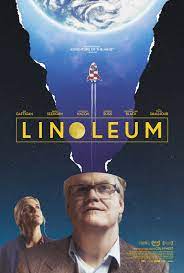
LINOLEUM
US, 2022, 101 minutes, Colour.
Jim Gaffigan, Rhea Seehorn, Katelyn Nacon, Gabriel Rush, Amy Hargraves, Michael Ian Black, Tony Shalhoub, Roger Hendricks Simon, Elizabeth Henry.
Directed by Colin West.
A small film with what one might call an unprepossessing title. Which may leave audiences wondering whether they should see this film or not. If they decide to watch it, they will find it something of a brainteaser.
We are in the American midwest, Cameron (American stand-up comedian, author, recording artist and actor, Jim Gaffigan) 50ish, his riding his bike when, suddenly, a bright red sports car all from the clear blue sky, crashing into the road behind him. We should keep that in mind throughout the film even as the narrative becomes, at times, very domestic-oriented in the small town.
Cameron has had dreams of being an astronaut, loves science and space technology, and, with his wife from whom he is now alienated, she planning divorce, has worked in the past, especially on a very local, small-budget television science education program for a children’s audience. They have a teenage daughter and a small son who never speaks.
Then some space junk falls from the sky in Cameron’s backyard. He decides to work on it, try to get its central apparatus working – and visiting the hospital where his father, suffering from dementia, still remembers technical details and Cameron installs him at home. The doctor at the home, Tony Shalhoub, has a lot of comments about dementia, it being all in the mind, the brain solidifying with an equivalent of plaque and not being able to break free. However, Cameron is not deterred, and makes friends with the young student, Marc (Gabriel Rush), who has a brutal father, scientist and TV broadcaster also, and also played by Gaffigan. Marc is bullied at school and teams up with Cameron’s daughter – and whole lot of scenes of teenager and high school life, prissy students, Halloween parties…
In the meantime, Cameron’s wife, Erin (Rhea Seehorn has been offered a new job, still has great affection for Cameron, clashes with her daughter…
For those who have been puzzling about aspects of the plot, how similar Marc’s father is to Cameron, a mysterious elderly woman seen standing vigil outside the house, they will be wondering about what is really happening, how really it is or not, or, as the doctor has suggested, so much happening in the mind. Perhaps one way of pondering the screenplay is to remember the 80s film and its evocative title, Back to the Future.
It does all come together at the end, quite strikingly in the last 15 minutes or so, still something of a tangle for those who are puzzling. So, a small film but one which keeps making demands on us as we watch – and unthreading the strands of the plot after we have seen it. As regards the title, Jim Gaffigan was asked and here is his, somewhat enigmatic, answer: “The linoleum is the floor that was present, and it’s kind of this dull flooring that you see in many different environments: in the basement, in the kitchen, in the doctor’s office”. In other words, the linoleum is the common thread.
- The title? Meaning? Reference? Enigmatic?
- The Midwestern town, homes, streets, school, home for the aged, science Museum, garage…? Musical score?
- Cameron and his story? Jim Gaffigan and his screen presence? His alter ego? Appearance, manner, contrast? Age, around 50, married to Erin, his daughter Nora, his small son? Bicycle, the street, the fall of the red car, posting his applications to NASA, the refusal? His reappraisal of his life? Erin, filing for divorce?
- Their role on the television science program, small-budget, studio and props, the love for science, demonstration? And their watching the program throughout the film?
- The space junk crash in the backyard? Moving out of the house? Cameron and his return, curiosity, wanting to do something with the junk, visiting his father, the aged care home, memory, the discussions with the doctor, taking his father home, setting him up in the garage? His continued work? Erin’s reaction?
- Marc, his brutal father, discipline, putting him down? Demands? Silent, the scenes at school, mocked? Nora, her approach, gay, conversations, keeping company, the growing friendship, at school, outside school? Marc, interest in the space junk, talking with Cameron? Bonding with Cameron, a benign father figure?
- Erin, conversations with her friend, advice, the interview for the new job, the prospects, her work at the Museum, having to move, the discussions with Cameron, in the bedroom, sharing? Her decision? Not to go? Her visit to the garage? The interactions with Nora, Nora highly critical? The apologies?
- Work in the garage, diligent, inventive, Cameron and his father, the experiment, some success, the blowout? Symbolic for Cameron of his life and achievements?
- The doctor, the comments about life being simple or not? Saying that was all in the mind? His image of the brain, covered with plaque, clogging?
- The mysterious woman, Cameron seeing her, day and night?
- The interaction between Cameron and his alter ego?
- The finale of the film, twilight zone themes, Back to the Future? The events in Cameron’s mind, memories, his growing dementia, memories of Erin, her supporting him up till the end, the generations, Marc, Cameron, his father, images of himself? Erin and the daughter? The news that they never had a child, the boy they wished they had?
- The finale, retrospective on life, its meaning, achievements, lack of achievement? Cameron in the space helmet? His death?
